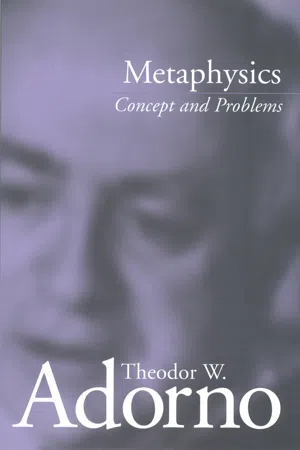
Metaphysics
Concept and Problems
Theodor W. Adorno
- English
- ePUB (disponibile sull'app)
- Disponibile su iOS e Android
Metaphysics
Concept and Problems
Theodor W. Adorno
Informazioni sul libro
This volume makes available in English for the first time Adorno's lectures on metaphysics. It provides a unique introduction not only to metaphysics but also to Adorno's own intellectual standpoint, as developed in his major work Negative Dialectics.
Metaphysics for Adorno is defined by a central tension between concepts and immediate facts. Adorno traces this dualism back to Aristotle, whom he sees as the founder of metaphysics. In Aristotle it appears as an unresolved tension between form and matter. This basic split, in Adorno's interpretation, runs right through the history of metaphysics. Perhaps not surprisingly, Adorno finds this tension resolved in the Hegelian dialectic.
Underlying this dualism is a further dichotomy, which Adorno sees as essential to metaphysics: while it dissolves belief in transcendental worlds by thought, at the same time it seeks to rescue belief in a reality beyond the empirical, again by thought. It is to this profound ambiguity, for Adorno, that the metaphysical tradition owes its greatness.
The major part of these lectures, given by Adorno late in his life, is devoted to a critical exposition of Aristotle's thought, focusing on its central ambiguities. In the last lectures, Adorno's attention switches to the question of the relevance of metaphysics today, particularly after the Holocaust. He finds in 'metaphysical experiences', which transcend rational discourse without lapsing into irrationalism, a last precarious refuge of the humane truth to which his own thought always aspired.
This volume will be essential reading for anyone interested in Adorno's work and will be a valuable text for students and scholars of philosophy and social theory.
Domande frequenti
Informazioni
Abbreviations
GS 1 | Philosophische Frühschriften, 3rd edn, 1996 |
GS 3 | Max Horkheimer and Theodor W. Adorno, Dialektik der Aufklärung. Philosophische Fragmente, 3rd edn, 1996 |
GS 5 | Zur Metakritik der Erkenntnistheorie/Drei Studien zu Hegel, 4th edn, 1996 |
GS 6 | Negative Dialektik/Jargon der Eigentlichkeit, 5th edn, 1996 |
GS 8 | Soziologische Schriften I, 4th edn, 1996 |
GS 9.1 | Soziologische Schriften I. Erste Hälfte, 4, 1975 |
GS 10.1 | Kulturkritik und Gesellschaft I: Prismen/Ohne Leitbild, 2nd edn, 1996 |
GS 10.2 | Kulturkritik und Gesellschaft II: Eingriffe/Stichworte/Anhang, 1977 |
GS 11 | Noten zur Literatur, 4th edn, 1996 |
GS 20.1 | Vermischte Schriften I, 1986 |
GS 20.2 | Vermischte Schriften II, 1986 |
NaS 1.1 | Beethoven. Philosophie der Musik, ed. Rolf Tiedemann, 2nd edn, 1994 |
NaS IV.4 | Kants ‘Kritik der reinen Vernunft’ (1959), ed. Rolf Tiedemann, 1995 |
NaS IV. 10 | Probleme der Moralphilosophie (1963), ed. Thomas Schröder, 1995 |
NaS IV. 15 | Einleitung in die Soziologie (1968), ed. Christoph Gödde, 1993 |